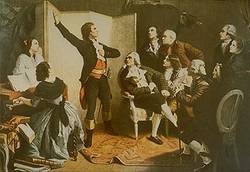Battle Hymn for the Army of the Rhine
In April 1792 the French Revolution declared war on the two powerful German monarchies, Habsburgs and the Hohenzollerns. The news of the declaration took several days to reach the eastern frontier of France, but it caused worry. People in Alsace and Lorraine were always affected by fighting, if not implicated in it directly. The towns and cities could be besieged by the Austrians and Prussians. Indeed, in August 1792 the city of Verdun would be taken over, an event preserved in Goethe's memoire Campaign in France and which motivated the extreme defense of that area in the First World War.Frédéric de Dietrich, the mayor of Strasbourg, was concerned as well. In a conversation with Joseph Rouget de Lisle (a captain and engineer in the French army), de Dietrich expressed his desire motivate soldiers and the citizens to defend the city and the country. De Deitrich implored the captain to write a song to rouse the people.

Pils painting of Rouget de Lisle singing the future national anthem at the home of De Dietrich

Rouget de Lisle's family was only recently tied to the French East. His noble parents had moved from southwestern France to Franche-Comte because they were Protestants. Rouget de Lisle was born in the Jura, the low areas of the French Alps. When he was posted to Strasbourg as part of the company "Enfants de la patrie"in 1790, Rouget de Lisle inserted himself in the musical life of the city. A meager musician, he composed words to simple and popular melodies.
Rouget de Lisle composed a song for the Army of the Rhine in a single night. His melody was somewhat well known: a dance tune that was easily adaptable and had already survived several lyrics by anonymous composers. He started with a call to his company: "Allons, Enfants de la patrie." And he drew the words from posters that were recently called the people to arms ("Aux armes, citoyens!"). The rest he filled with words about defending the country against tyranny, promising that liberty would be won by defeating enemies, both internal and external.
Rouget de Lisle debuted the song the next evening in the mayors home. Not a great musician, the mayor's wife filled out the harmony as she accompanied him at the keyboard. It was a hit. The song spread quickly through the contentious atmosphere of Strasbourg: the melody was familiar, and the words were easy to learn as well as inspirational. In a short time the song, the Chants de guerre pour l'Armee du Rhin, began traveling along the eastern frontier, becoming a symbol for the defense of France. But Parisians noted it with little enthusiasm when a company from Huningue (southern Alsace) introduced it.
However, the Parisians took note when a group of federalists from Marseilles sang the Chants de guerre as they marched toward Paris. And it was with that city that Parisians identified the song--La Marseillaise.
Perhaps it would be silly to complain about the title of the French national anthem--it would belong to the nation, not to Strasbourg and Alsace. Rouget de Lisle was not Alsatian by origin, although he showed the same sensibilities as an easterner.
The identification of the song with Marseilles rather than Strasbourg does say something about the perceptions that Frenchmen had of Alsatians. Because of differences language and customs, Alsatians were considered suspect. If all Frenchmen should speak French, then Alsace was in revolt.
These attitudes betrayed the patriotism of Alsatians, who were fierce defenders of the French Revolution and, especially, the Napoleonic Empire. They celebrated the nation built on rights that was born of the Revolution that would allow for cultural differences. Because they would not integrate, they were seen as turning their backs on France. The public memorial to General Jean-Basptiste Kleber was obstructed by successive French governments. Even their role in creating a national symbol has been denied to them in the popular consciousness. La Marseillaise was not composed in some non-place. It was the product of real circumstances; its popularity is due to the fears of people who could hear the drums of war. France would have problems acknowledging regional contributions to national culture--La Marseillaise is but one example.





1 Comments:
Find and download what you need at Rapidshare Search Engine.
Top Site List Free Proxy Site Free Download mp3 Michael Jackson song All Michael Jackson Lirics Oes Tsetnoc Mengembalikan Jati Diri Bangsa
Post a Comment
<< Home